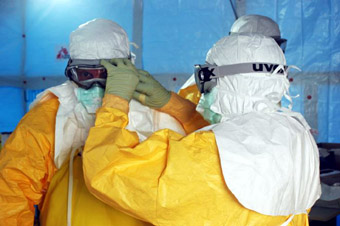
outerwear in preparation of treating Ebola patients in Liberia last week;
photo courtesy of CDC.
Ebola May Place Entire Countries In Quarantine
| published September 7, 2014 |
By R. Alan Clanton
Thursday Review editor
The recent outbreak of Ebola virus has been the worst since the hemorrhagic fever first appeared in 1976. More than 3500 people have been affected, and as many as 1552 deaths have been attributed to this year’s outbreak (the World Health Organization puts the death toll at just under 2000; but other health organizations place the figure at 1552).
Most of those infected by the 2014 epidemic are in the African countries of Sierra Leone, Liberia, Guinea, and Nigeria.
In tiny Sierra Leone, tucked along the Atlantic coast between Guinea and Liberia, the situation has become so dire that government authorities there plan to enforce a mandatory 72-hour shut-down of the whole country. Residents will be required to stay in their villages and towns, and remain in their homes. Most work will come to a stop, except for the necessary public services. Shops and markets will be closed, and the lockdown will be enforced by the military and local police. Medical teams and researchers—dressed in hazardous materials suits and airtight hoods—will comb through streets, alleys and neighborhoods, going door-to-door to administer tests and locate those who may be avoiding treatment, or those who may be hiding from authorities out of mistrust.
Sierra Leone’s planned lockdown mirrors one enforced by Liberia last month—a mandatory, at-gunpoint quarantine of several neighborhoods so that soldiers and medical teams could enter the area in search of people spreading the disease.
The goal in Sierra Leone, where the disease may be spreading the fastest, is to quickly identify those who may already have the virus in their system but do not yet have any of the symptoms. The lockdown will also give medical teams the necessary time to go door-to-door to provide treatment to those already sick—some of whom may be too ill to travel out of their homes, and others who are just afraid of the police or the medical workers.
But the lockdown in August stirred protests and even violence in Liberia, where police and military clashed with civilians. Some observers say that Sierra Leone’s proposed shutdown may trigger similar unrest.
Sierra Leone has scheduled its nationwide lockdown to begin on September 19. The lockdown will last for three days, but possibly longer if medical teams are unable to reach all towns and neighborhoods. Authorities want citizens to stay put in one place, since travel—even on foot—would cause confusion among the medical teams, and could easily spread the disease to other areas.
Some international and non-profit aid groups are concerned about the impact of a mandatory shutdown. Doctors Without Borders, and international medical organization, has stated publicly that it fears a gunpoint-style quarantine will make the situation worse, causing many in an already fearful and distrustful population to hide or evade contact with doctors. Such measures, the group said in a statement, result in “driving people underground and jeopardizing the trust between people and health providers.”
But Unicef, an organization funded by the United Nations, has endorsed the lockdown as the only reliable way to full vet the population and treat the sick.
The World Health Organization (WHO) has endorsed the use of blood transfusions as a means of combatting the spread of Ebola. But transfusions are expensive and require large amounts of blood, and as a result other medical research teams are hoping to identify a more reliable form of treatment. The symptoms of Ebola virus come on very quickly and drastically, and can include extremely high fever coupled with diarrhea and vomiting. The 2014 outbreak has led to a roughly 50% mortality rate, making it one of the deadliest epidemics in decades.
The Ebola virus is named for the Ebola River, which flows through parts of the Democratic Republic of the Congo (then called Zaire), where several small villages contained the first victims of the newly-discovered virus in 1976.
Related Thursday Review articles:
Ebola, Magnified X25K; By Thursday Review staff; Thursday Review; September 5, 2014.
